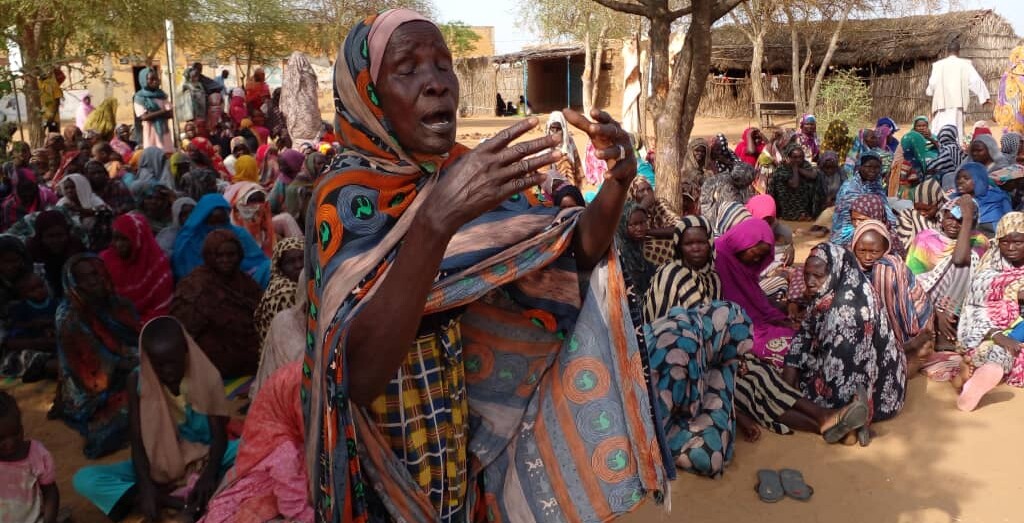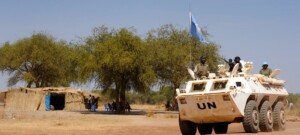ACJPS sheds light on ongoing human rights atrocities plaguing Sudan

People gather at the centre of the El Salam displaced camp (also known as Abuja camp) near El Fasher in North Darfur, August 2023 (File photo: RD)
As the armed conflict in Sudan enters its second year, a damning report by the African Centre for Justice and Peace Studies (ACJPS) sheds light on the ongoing human rights atrocities plaguing the nation. Documented violations include extrajudicial killings, ethnically motivated attacks, conflict-related sexual and gender-based violence, arbitrary detentions, enforced disappearances, recruitment of child soldiers, communication shutdowns, attacks on human rights defenders, and the collapse of key government institutions.
The violent conflict, which erupted in Khartoum in April 2023 between the Sudan Armed Forces (SAF) and the Rapid Support Forces (RSF), has since spiralled into catastrophe, spreading across various regions of Sudan. Civilians have withstood the worst of the violence, facing unimaginable horrors at the hands of warring factions. This report explores the incidents of human rights violations that have continued to take place since the start of the war.
Extrajudicial killings
The ACJPS report highlights the indiscriminate targeting of civilians through aerial bombings, gunfights, and armed attacks by both SAF and RSF. Shocking incidents include the bombing of villages resulting in civilian casualties and gunfights claiming numerous lives. The report discusses the difficulty in determining the exact death toll in Sudan since the outbreak of hostilities.
The UN reported that as of April 2024, 14,790 people were killed directly by military action. However, many more died due to disruptions in the health system, lack of access to medical treatment, and disease outbreaks. Incidents documented by ACJPS indicate violations of international human rights law, including arbitrary deprivation of life and unlawful killings during hostilities. Examples include a military aircraft bombing a village in Darfur, resulting in civilian deaths, and gunfights in Nyala city causing numerous casualties.
In November 2023, a video surfaced showing five civilians being shot by armed men, believed to be RSF members. Two civilians were killed instantly. In March 2024, the Hadra area of Delami in the Nuba Mountains was bombed by the SAF, resulting in the deaths of 11 students and two teachers when at least two bombs were dropped on a school.
Ethnically motivated attacks:
Ethnic tensions have exacerbated the conflict, particularly in West Darfur, where Arab and African communities face targeted violence. Massacres and conflicts between militia groups have left thousands dead and displaced. Between May and November 2023, at least ten attacks against civilians occurred in El Geneina and surrounding areas, with thousands killed, primarily from the Masalit community.
The governor of West Darfur, a prominent Masalit leader, was also killed while in RSF custody. An independent report suggested a massacre in El Geneina alone resulted in 10,000-15,000 deaths. In March 2024, a conflict between RSF allied militia groups in Forbraga town resulted in 11 deaths. Additionally, killings occurred in Morni and Ardamata, where at least 87 bodies were found in a mass grave.
Conflict-related sexual and gender-based violence
The report delves into the forms of sexual and gender-based violence (SGBV), including mass rapes, gang rapes, domestic violence, sexual exploitation, and sexual slavery, have been reported. Instances of rape, sexual slavery, and other forms of gender-based violence have surged, affecting women and girls across Sudan. The brutality extends to areas previously considered safe, with reports of atrocities even within refugee camps, extending beyond traditional conflict zones like Khartoum and Darfur to other regions such as Kordofan.
The UN reported a surge in the number of people in need of SGBV services, expected to reach 6.9 million. OHCHR documented 58 incidents of conflict-related sexual violence involving at least 118 victims, perpetrated by both conflict parties and their allied groups across different states. Internally displaced women and girls face heightened vulnerability to sexual violence, even within temporary shelters and while seeking refuge. Perpetrators, including the RSF and SAF, have been identified, with incidents including rape by armed men in SAF uniform.
In Darfur, SGBV is used to exacerbate ethnic conflicts, targeting displaced women and girls, particularly of African ethnicity. A new trend of sexual slavery has emerged, with women and girls abducted, held in degrading conditions, and forcibly married, often for ransom. The report states how victims face significant barriers to reporting, including a non-functioning justice system, fear of stigma, and distrust in authorities.
Arbitrary detentions
Hundreds of civilians, including activists and journalists, have been arbitrarily detained by both sides, often held incommunicado and subjected to torture. The whereabouts of many remain unknown, while others have faced death in custody. The report exclaims how hundreds of civilians have been arbitrarily detained by both parties to the conflict, with many remaining missing. Victims are often seized from the streets, checkpoints, or their homes without explanation or access to legal aid or family contact.
Detainees are held in various facilities, including military and security sites, prisons, and civilian buildings. Reports suggest torture and prolonged incommunicado detention, particularly by the RSF, targeting suspected members or affiliates of opposing factions, as well as ethnic minorities.
Both SAF and RSF have targeted specific groups, including journalists, lawyers, and activists. Although some have been released, many detainees, including women, remain unaccounted for. Mass recruitment drives in SAF-controlled areas have led to abuses by newly recruited civilian soldiers, who exploit their positions for arbitrary arrests, extortion, and harassment of civilians, often with impunity.
Inhuman treatment and torture
Victims who have escaped or been released from detention have recounted severe torture by both conflict parties in Sudan, aimed at extracting information or coerced confessions and to degrade or humiliate them. Torture methods include electric shocks, beatings with various objects, flogging, deprivation of basic needs like food and water, suspension in stress positions, and exposure to extreme weather conditions.
Detention facilities are described as overcrowded, with shortages of essentials like food and medical care. Some detainees have died due to poor conditions and medical neglect, such as Mr. Mohammed Ahmed Badri, who died in September 2023 after being shot and denied medical attention while in SAF custody.
Enforced disappearance
As per the report, the Sudanese Group for Victims of Enforced Disappearance (SGVED) has documented a significant rise in disappearances, with 1,141 people missing by April 2024, including 123 women and 1,018 men. This marks a stark increase from previous counts. Enforced disappearances target civilians accused of supporting or affiliating with warring parties, and sometimes have financial motives.
Journalists, activists, and community responders advocating for adherence to international humanitarian law have also been forcibly disappeared. Other initiatives such as the“Missing Initiative”, report a total of 990 cases of enforced disappearances since the conflict erupted and report publication.
Recruitment of child soldiers
The widespread recruitment of children into armed factions, driven by poverty and coercion, adds to the humanitarian crisis. Children are exploited as combatants, forced to participate in hostilities, and endure unimaginable trauma. The RSF have been particularly implicated, using money and false promises to lure children into the conflict.
ACJPS monitoring in Central Darfur state confirmed the presence of child soldiers at various locations, including checkpoints and during gunfire exchanges. In November 2023, ACJPS documented the detention of 66 children by the RSF, who were coerced into recording videos accusing SAF of recruiting child soldiers. They were released a week later following intervention by the International Rescue Committee.
Human rights defenders:
Human rights defenders (HRDs) face threats, harassment, and violence for their advocacy work. Sudan experienced a complete communications shutdown on February 7, following significant disruptions at the end of January 2024. According to the report, the reasons for the shutdown remain undisclosed, posing risks to emergency coordination and humanitarian aid for millions affected by the conflict. It severely limits people’s ability to communicate with family, access essential services, and hampers human rights defenders’ efforts to document atrocities. This shutdown also caused anxiety among Sudanese abroad unable to contact their loved ones in the country.
HRDs and aid workers, including healthcare workers, have faced targeted attacks, including kidnapping, detention, torture, and sexual violence. At least eight HRDs have been killed since the conflict began. Incidents include the detention of Nizar Abu Zaid and four resistance committee members in April. Women HRDs also face sexual violence and threats, with at least five women human rights defenders and first responders facing detention, harassment, or threats in recent weeks in areas controlled by both conflict parties.
Impacts and Recommendations
The report concludes with a call to action urging the need for a commission regarding the ongoing conflict, highlighting gross violations of international human rights law and international humanitarian law, potentially amounting to war crimes, by both SAF and RSF.
It calls for support to end the conflict, efforts to hold perpetrators accountable, condemnation of ongoing violations including indiscriminate attacks on civilian areas and ethnic-based attacks and addressing impunity of security forces. Additionally, it calls for the publication of investigation reports on violations since April 15, 2023, and dispatching investigation teams to address crimes, particularly sexual and gender-based violence.











 and then
and then